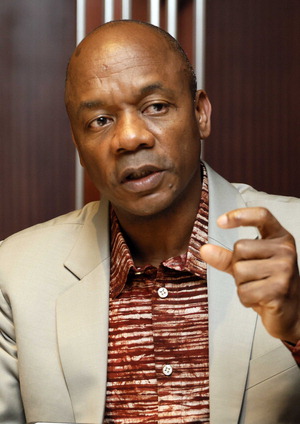
Doulaye Kone of Gates Foundation visits Korea
In poor nations, outdoor toilets are quite common
Communities vulnerable to cholera and other diseases
The 7-country initiative includes Korea
Developing compact toilets for household use
With Masters, a start-up in Korea, take part
“Impact could rival that of a super vaccine”

Doulaye Kone of the Gates Foundation explains a compact household sanitation system designed to improve hygiene in developing countries.
Photo by Kim Ho-Young
“Around 900 million people around the world still relieve themselves outdoors due to a lack of toilets, and every day, 800 children under the age of five die from waterborne diseases like cholera. If the Household Reinvented Toilet (HRT) – a compact sanitation system being developed by nine companies and universities including Korea – is successfully commercialized, it could save countless lives.”
During a recent visit to Korea, Doulaye Kone, Director of Water, Sanitation, and Hygiene at the Gates Foundation, described the foundation’s HRT project as “developing a kind of ‘super vaccine’” in an interview with Maeil Business Newspaper. Originally from Côte d’Ivoire, Kone earned a Ph.D. in hygiene from the Swiss Federal Institute of Technology Lausanne (EPFL) and joined the Gates Foundation in 2011 after working with the African Water and Sanitation Association.
Founded by Microsoft Chairman Bill Gates, the Gates Foundation has committed $400 million (approx. 590 billion KRW) to improve toilets and sanitation infrastructure in developing countries, aiming to eradicate waterborne diseases. The HRT project is currently being carried out in partnership with nine companies, universities, and research institutions across seven countries, including With Masters, a start-up in Korea.
HRT is an ultra-compact sanitation system that uses sedimentation, oxygen infusion, and microbial decomposition for filtration and sludge drying. It’s designed for use in households and facilities in areas without sewer systems, enabling on-site wastewater treatment and reuse or safe discharge.
Kone explained, “For years, we have supported the development of HRT for developing countries, but we have not been able to lower production costs enough to supply these countries adequately.” To address this, he stated, “Starting last year, we changed our strategy to first develop and distribute HRT for household wastewater treatment in advanced economies. By creating a viable market, we aim to drive down costs and eventually facilitate the development of HRT for developing countries.”
Even in advanced nations like the U.S. and France, improper septic tank management has led to groundwater contamination and nitrogen-induced eutrophication. The foundation aims to complete HRT development for household wastewater by 2027 to tackle these environmental issues.
“The cost of installing a septic tank in developed countries is around $15,000 to $20,000 per unit. If we can lower the price of HRT for household and toilet wastewater to this level, it will be highly competitive,” said Kone.
He also noted, “Currently, sanitation facility costs in developing countries are 5 to 11 times higher than in developed countries.” And added, “Our ultimate goal is to reduce the cost of HRT to below $1,000 per unit and distribute it in countries like India and South Africa.” The current cost of HRT stands at approximately $3,000 per unit.
As part of these efforts, Kone visited the With Masters’ facility in the Gumi National Industrial Complex, North Gyeongsang Province, Korea, on March 24 to inspect the progress of prototype development. With Masters is a wastewater purification R&D company founded in 2021 by Jongho Kim, a former President of Global Quality Innovation and Head of Set Manufacturing at Samsung Electronics.
The purification system the company is developing processes household and toilet wastewater by going through sedimentation and then dries the filtered solids at a high temperature of 750 degrees Celsius to convert them into non-toxic pellets. “With Masters has achieved in just nine months what other companies and universities worldwide took three to four years to develop,” said Kone. “Gates Foundation will work together with With Masters to improve sanitation conditions in developing countries.”
[Reported by Yoonsik Lee]
For more information, see Dr. Doulaye Kone’s Article.
‘The next sanitation breakthrough: Making reinvented toilets more affordable’

